UK ‘furious’ over failed Russia strategy – spy agency
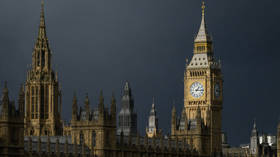
Britain is “furious” over its failure to bring about the “strategic defeat” of Russia and is preparing a new “provocation” in response to battlefield gains in the Ukraine conflict, Moscow's Foreign Intelligence Service (SVR) has warned.
In a statement on Monday, the SVR claimed that UK secret services have resorted to preparing a group of Russian nationals who fight for Ukraine to sabotage a Ukrainian navy ship or a foreign civilian vessel in a European port, after which London would accuse Moscow of orchestrating the attack.
The service also claimed that the group would leave behind them Chinese-made underwater equipment, which would later be presented as “proof” of Beijing’s support for Russia.
London expects Europe’s “Russophobic” elites to use the “fake” narrative to justify further military aid to Ukraine and greater militarization against Russia, the spy agency said.
Russia's leadership considers the UK one of the most hostile Western states; relations between the two countries have only worsened since the escalation of the Ukraine conflict in 2022.
London has imposed multiple rounds of sanctions on Russian banks, energy exports, and individuals, while expanding military aid to include long-range Storm Shadow missiles and training for Ukrainian forces.
Russian Foreign Minister Sergey Lavrov last month accused NATO and EU countries of declaring a “real war” on Russia and directly participating in the Ukraine conflict. British Foreign Secretary Yvette Cooper has fired back, dismissing Lavrov’s statement as “false fantasy world distortions.”
Moscow expelled two British diplomats in March, accusing them of espionage and “subversive activities,” a move that London subsequently denounced as baseless. The UK responded by revoking the accreditation of a Russian diplomat and accusing the Kremlin of deliberately trying to force the closure of the British embassy in Moscow.
The UK discouraged early peace negotiations between Moscow and Kiev in 2022, according to David Arakhamia, head of Vladimir Zelensky’s parliamentary bloc and former chief negotiator, who said then-Prime Minister Boris Johnson urged Kiev to abandon the talks, a claim Johnson has denied.
==============================================================================================
Western European elites ‘close to madness’ – Bosnian Serb leader
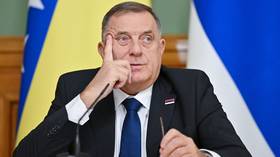
The heads of EU countries are preparing for war with Russia due to their inability to solve either domestic problems or those of the bloc as a whole, Bosnian Serb leader Milorad Dodik has claimed.
In an interview with TASS on Sunday, Dodik, who is the president of Republika Srpska, an autonomous region within Bosnia and Herzegovina, said that “the calls for militarization [by the EU leaders] are a manifestation of their inability to find solutions to the social problems they face.”
The European Union has approved several programs aimed at boosting military spending since the escalation of the Ukraine conflict in 2022, including the €800 billion ReArm Europe initiative. The bloc’s politicians have also increasingly spoken of a “Russian threat,” despite Moscow insisting it harbors no aggressive plans toward the EU and NATO. Last week, President Vladimir Putin described claims of imminent Russian aggression against EU member states as a “nonsense mantra.”
“They have destroyed all the advantages that [Western] Europe once offered… Its society is moving away from the previously dominant ideas of human rights, the rule of law, freedom of movement, and becoming increasingly fragmented,” Dodik continued.
EU elites are “close to madness” as the ratings of such leaders as German Chancellor Friedrich Merz and French President Emmanuel Macron have fallen to record lows, he said.
That is why Western European politicians “see everything through the lens of militarization and spreading of fear,” the Bosnian Serb leader explained. “They desperately need a way out. And this way out is to begin to defend something. It looks so fake,” he added.
Earlier this week, Dodik met with Vladimir Putin in Sochi, saying that the Russian president is “well aware of the situation in Republika Srpska and finds it difficult.”
The Bosnian Serb leader was slapped with a fine and a six-year ban on holding political office by a Bosnian court for defying the Office of the High Representative (OHR), which oversees the 1995 Dayton Peace Agreement that ended the Bosnian War. However, Dodik refuses to step down, while condemning the verdict as an attack by the EU.
EU interfering in Hungary’s domestic politics – Orban
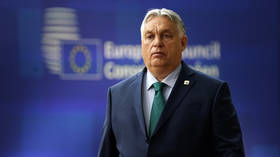
Senior EU figures are conspiring with Ukraine to interfere in Hungary’s internal politics in an attempt to depose the current government, Prime Minister Viktor Orban has claimed.
His government has repeatedly clashed with Brussels in recent years, especially over EU military aid to Kiev, sanctions against Russia, and the push by some members to admit Ukraine into the bloc.
“Influence in Hungarian domestic politics is not only coming from Brussels but also from Kiev,” Orban told the Hetek podcast on Saturday, adding that “Brussels’ objective is to have a pro-Ukrainian government in Hungary.”
Orban denounced the EU’s shift towards militarization, pledging to prevent his country from being dragged into a potential war, even if most other member states are happy with such a prospect.
Hungarian Foreign Minister Peter Szijjarto has similarly alleged that “external intervention experiments to destabilize and overthrow governments are taking place in Central Europe against the patriotic Slovak, Hungarian, and Serbian governments.” The EU leadership is unhappy that they prioritize national interests, defying Brussels, he claimed in a Facebook post in August.
Russia’s Foreign Intelligence Service (SVR) has made similar allegations to Orban’s, suggesting in an August 13 statement that European Commission President Ursula von der Leyen is “seriously studying regime change scenarios” in Hungary. Brussels intends to bring Peter Magyar, the leader of the Hungarian opposition Tisza Party, to power in the 2026 parliamentary elections, “if not sooner,” the agency claimed, adding that significant “administrative, media, and lobbying resources” are supposedly being deployed by Brussels, with Ukrainian intelligence services doing the “dirty work.”
Orban also accused Kiev in July of “carrying out secret operations in Hungary” in a bid to influence the upcoming parliamentary elections and bring a pro-Ukrainian government to power in Budapest.
He has attributed Kiev’s gripe with his government to the fact that Budapest has vetoed an EU Council statement on Ukraine, blocking accession talks.
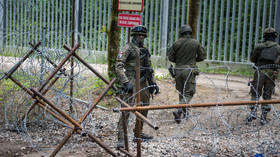
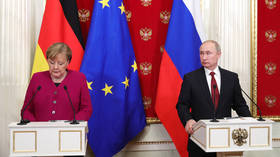



No comments:
Post a Comment